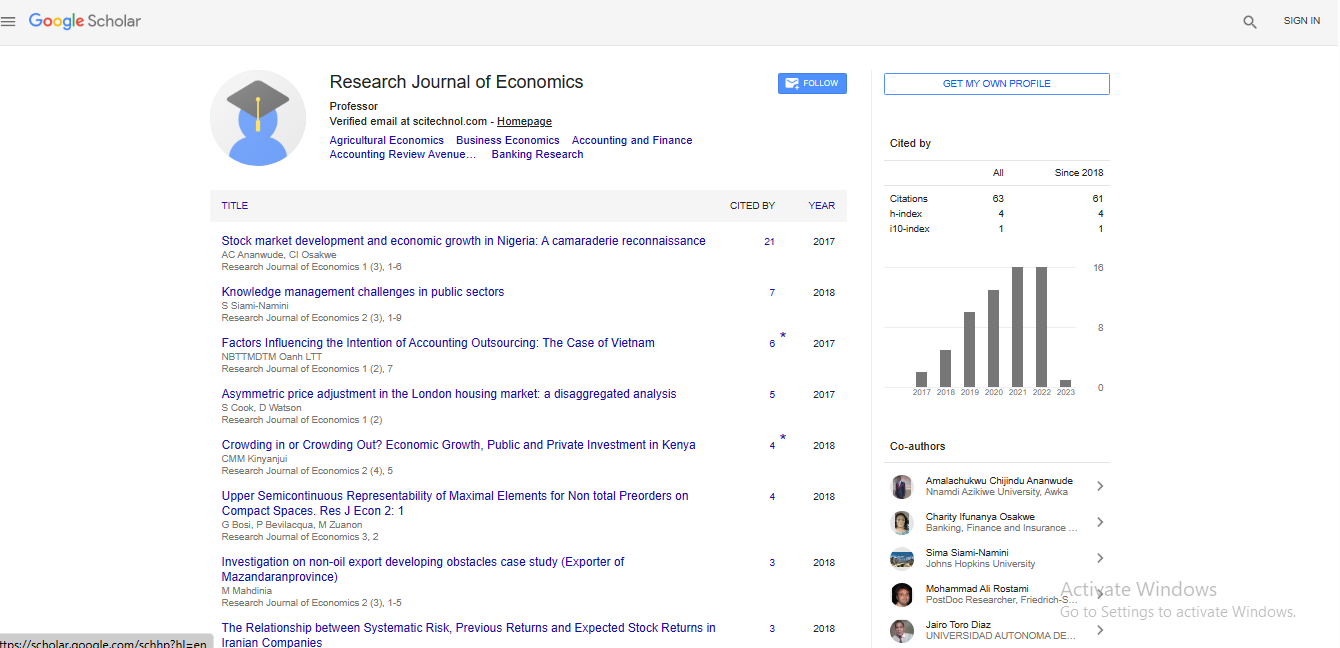Commentary, Res J Econ Vol: 7 Issue: 5
An Overview on Historical Evolution of Banking and its Functions
Ingrid Laue*
1Department of Medical Education, University of Melbourne, Parkville, Australia
*Corresponding Author: Ingrid Laue,
Department of Medical Education,
University of Melbourne, Parkville, Australia
E-mail: laueingrid@uit.ac.au
Received date: 01 September, 2023, Manuscript No. RJE-23-117588;
Editor assigned date: 04 September, 2023, PreQC No. RJE-23-117588 (PQ);
Reviewed date: 18 September, 2023, QC No. RJE-23-117588;
Revised date: 25 September, 2023, Manuscript No. RJE-23-117588 (R);
Published date: 02 October, 2023 DOI: 10.4172/RJE.1000165
Citation: Laue I (2023) An Overview on Historical Evolution of Banking and its Functions. Res J Econ 7:5.
Description
Banking is an essential pillar of modern economies, providing important financial services that facilitate the smooth functioning of businesses, individuals, and governments. Its history dates back thousands of years, with the concept of banking evolving from simple money-lending practices to sophisticated financial institutions offering a wide array of services.
Historical evolution of banking
The origins of banking can be traced back to ancient civilizations where merchants and moneylenders offered financial services. The first known banking practices occurred in ancient Mesopotamia around 2000 BC, where temples served as repositories for people's valuables. As trade and commerce grew, so did the need for secure places to store wealth and facilitate transactions.
The concept of modern banking began to emerge during the Italian Renaissance in the 14th and 15th centuries. The Medici family established banks and pioneered the use of bills of exchange, effectively creating the first banking system in Europe. Over time, banking spread across the globe, evolving to meet the changing needs of societies and economies.
Functions of banking
Modern banking encompasses a wide range of functions that cater to diverse financial needs. The primary functions of banking include:
Accepting deposits: Banks serve as custodians for the savings and deposits of individuals and businesses. Deposits can be in the form of current accounts, savings accounts, fixed deposits, or Certificates of Deposit (CDs).
Lending and credit: Banks lend money to individuals and businesses in the form of loans, mortgages, and credit lines. They play a crucial role in allocating capital to productive ventures, thereby driving economic growth.
Payment processing: Banks facilitate the transfer of funds between individuals and entities, enabling the smooth flow of money for various transactions.
Foreign exchange services: Banks facilitate currency exchange and offer international payment services, making global trade and travel more accessible.
Investment services: Banks provide investment products and advisory services to help clients grow and manage their wealth effectively.
Trade finance: Banks offer trade finance solutions, such as letters of credit and export-import financing, to support international trade.
Banking and regulation
Given the important role banks play in the economy and the potential risks they can pose, governments and regulatory bodies have established comprehensive frameworks to oversee banking operations. Banking regulations focus on areas such as capital adequacy, liquidity requirements, risk management, and consumer protection.
Basel accords: The Basel committee on banking supervision developed a series of accords (Basel I, II, and III) to establish international standards for bank capital adequacy and risk management.
Deposit insurance: Many countries have deposit insurance schemes in place to protect depositors' funds up to a certain limit, instilling confidence in the banking system.
Central bank oversight: Central banks, as monetary authorities, supervise and regulate banks to maintain stability and control monetary policies.
Consumer protection laws: Governments enact laws to safeguard consumers from unfair practices and ensure transparency in banking transactions.
Banking and economic growth
The banking sector's role in fostering economic growth is crucial. Efficient and stable banks contribute to economic development in several ways:
Capital allocation: Banks allocate capital to productive ventures, such as businesses and infrastructure projects, which stimulates economic activity and job creation.
Financial intermediation: Banks act as intermediaries between savers and borrowers, mobilizing funds from surplus sectors of the economy to those in need of capital.
Promotion of investment: By providing loans and financial advice, banks encourage investment in businesses, leading to innovation and expansion.
 Spanish
Spanish  Chinese
Chinese  Russian
Russian  German
German  French
French  Japanese
Japanese  Portuguese
Portuguese  Hindi
Hindi 